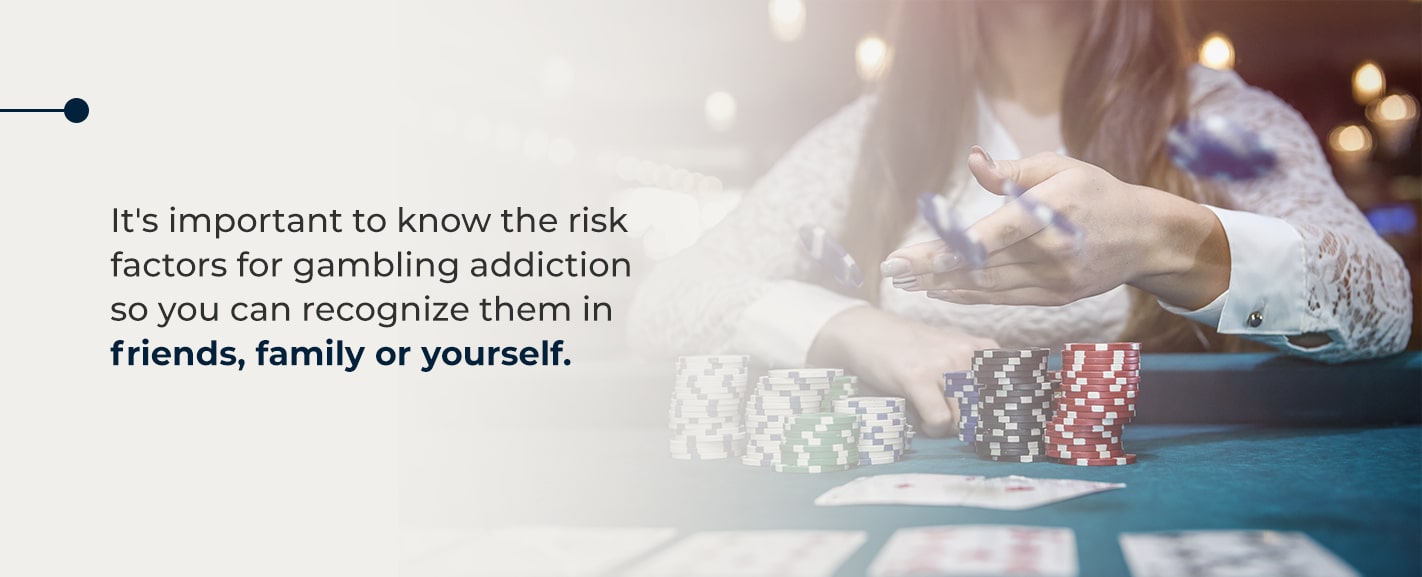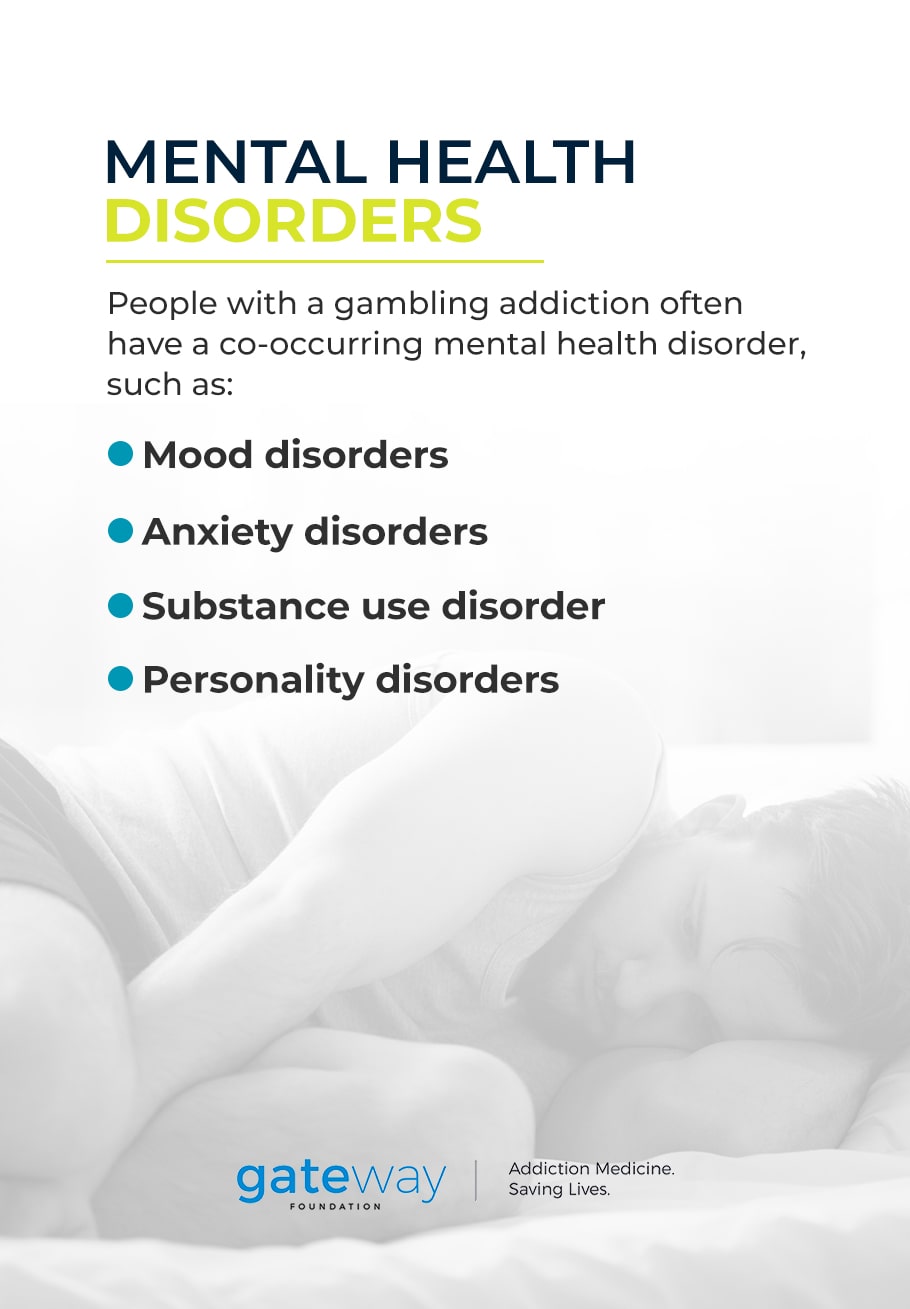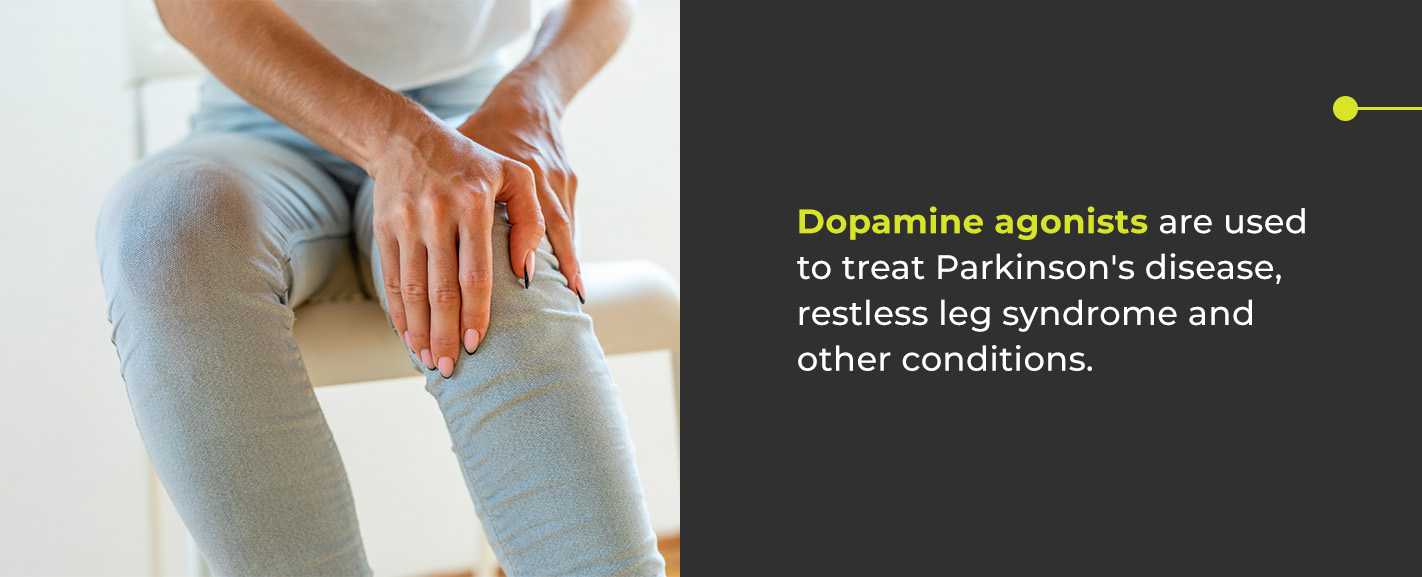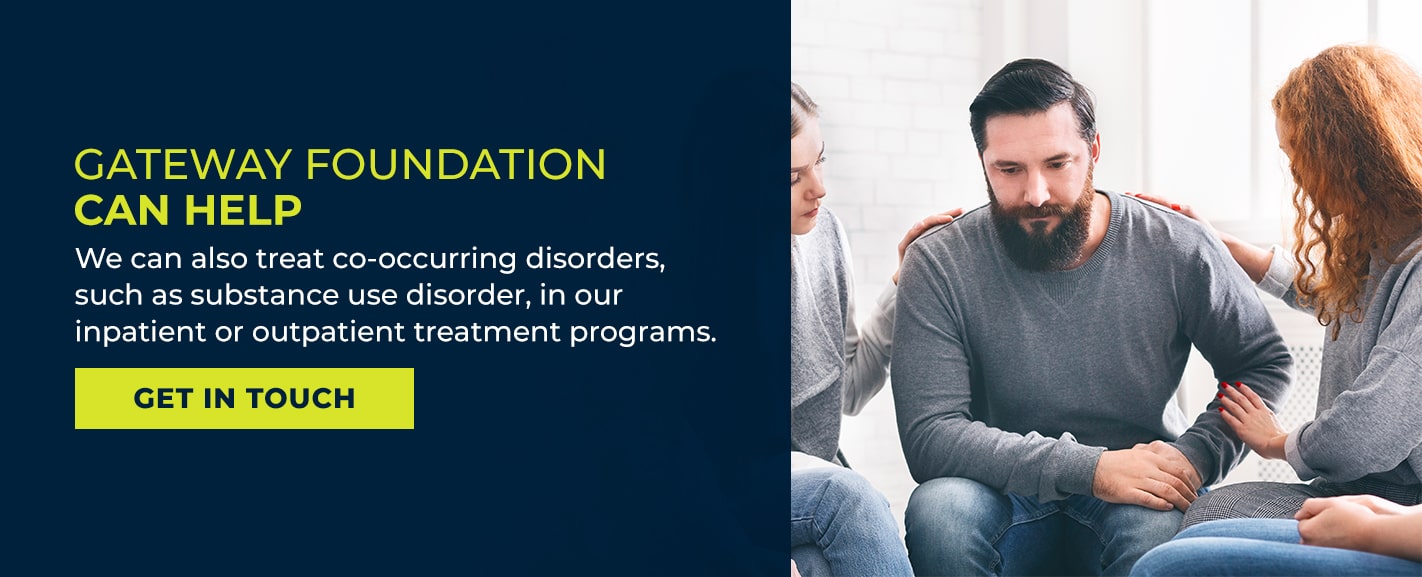- Jan 7
- Addiction
If a family member, friend or spouse likes to gamble, you might wonder if it’s something to worry about. What if they get addicted to gambling? Who is at risk for developing a gambling addiction anyway? Maybe you’re questioning your own habits.
Not everyone who gambles develops a gambling disorder. But some people are more prone to gambling addiction than others.
Gambling addiction is a serious disorder characterized by an irresistible urge to gamble despite the negative consequences. People who have a gambling disorder commonly experience problems with their relationships, health and finances. For some people, a gambling disorder can cause them to lose everything important to them.
Common risk factors for gambling addiction include mental health disorders, age and certain personality characteristics. These factors put someone at increased risk of developing a gambling addiction. However, anyone can become addicted to gambling, just as anyone can develop an addiction to drugs or alcohol.
If you’re concerned about your or a loved one’s gambling behaviors, it helps to know if you’re at risk of addiction.
Why It’s Important to Know the Risk Factors
It’s important to know the risk factors for gambling addiction so you can recognize them in friends, family or yourself. For example, stress and impulsivity are risk factors for gambling disorder. If you have a friend who’s under a lot of stress and who tends to act on impulse, you might encourage them to seek help if they’ve been gambling more than usual lately.
Overall, by knowing what makes someone more vulnerable to gambling disorder, you can help them or yourself stay off the path to addiction. This may mean preventing addiction by replacing gambling with a new hobby or finding healthier ways to relieve stress. If a mental health disorder contributes to compulsive gambling, professionals can help. A combination of therapy, support and medication can treat underlying issues or address risk factors before gambling leads to devastating consequences.
Risk Factors for Gambling Disorder
Researchers aren’t sure what commonly causes gambling addiction, but they have identified the following risk factors:
1. Mental Health Disorders
Having a mental health disorder like depression can make someone more vulnerable to gambling addiction, particularly if they leave the problem untreated. Often, people who engage in compulsive gambling use gambling as a way to escape emotional pain. Gambling can have a powerful effect on someone battling a mental health issue because it gets them into a “zone” far from life’s problems.
Gambling also stimulates the brain’s reward system, causing a dopamine release and making a person feel confident and happy. The thrill and pleasure of gambling can be addictive and feel like a way to self-medicate.
People with a gambling addiction often have a co-occurring mental health disorder, such as:
- Mood disorders: Mood disorders, such as depression and bipolar disorder, affect how people feel, despite their circumstances. Someone with depression, for instance, might feel sad or empty even when life seems to be going well. Researchers believe that individuals with mood disorders use gambling as a maladaptive coping strategy and a way to escape their symptoms. According to research on the association between mood disorders and problem gambling, 70% of study participants reported that a mood disorder preceded problematic gambling behavior.
- Anxiety disorders: Anxiety disorders, like generalized anxiety disorder, are characterized by persistent and uncontrollable worry and fear. For some individuals with anxiety, gambling seems to relieve their symptoms. However, this relief is typically short-lived, and anxiety symptoms return with greater intensity. The person uses gambling to cope with anxiety again, and a cycle of addiction begins. According to a study in the Journal of Behavioral Addictions, severe anxiety symptoms significantly correlate to gambling behavior.
- Substance use disorder: Substance use disorder is a disease that impacts the brain and affects a person’s ability to control drug or alcohol use. Several studies show that different types of substance use often co-occur with problem gambling. Also, people who have a substance use disorder are at an increased risk of developing a gambling addiction.
- Personality disorders: Individuals with a personality disorder, like antisocial personality disorder, may be more prone to gambling issues. For example, people with antisocial personality disorder may act impulsively, struggle with substance use and disregard what’s right and wrong.
Obsessive-compulsive disorder and attention deficit hyperactivity disorder (ADHD) are also associated with compulsive gambling.
2. Age
Young people are more vulnerable to developing a gambling disorder than adults. According to the Journal of Child and Adolescent Behavior, around 5% of teenagers in the United States have problems with compulsive gambling. By contrast, only about 1% of adults have a severe gambling problem.
Teens and young adults might develop a gambling addiction for several reasons:
- Self-esteem: Adolescents are going through many different biological and emotional changes that can impact their self-esteem.
- Peer approval: Teens might use gambling to win the approval of their peers and hide their insecurities.
- Coping: Adolescents may struggle to cope with stress or negative events if they haven’t yet learned healthy coping strategies. When they gamble, they might feel less overwhelmed by life’s problems and difficult emotions, like anger, frustration or fear.
- Entertainment: Gambling provides entertainment and excitement, appealing to adolescents who feel bored. When combined with other risk factors, like mental health issues and low self-esteem, this form of entertainment can quickly become an addiction.
Even though younger people are more likely to have a gambling problem than other age groups, older adults are not immune to this disorder. According to a 2020 research article, around 70% of adults over the age of 60 have gambled in the past year, and about 2% of them are at risk of developing a gambling disorder.
Many older adults gamble for recreation and do not develop a problem. Still, some older adults are vulnerable to compulsive gambling, especially if they have risk factors like a chronic medical condition, financial hardship, depression or social isolation.
The truth is, anyone can develop a gambling addiction, whether they are a teen, middle-aged adult or older adult. The prevalence of gambling disorders has increased across all age groups worldwide.
3. Age You Start Gambling
Can you or your loved one remember the first time you placed a bet? If it happened during your childhood or teenage years, you’re not alone. Past studies have shown that most adults with a gambling disorder started gambling when they were teenagers.
Although someone can have a problem with gambling after their first game, a gambling disorder can take years or even decades to develop. Early prevention and treatment are key to helping teenagers overcome problematic gambling behavior and avoid the many consequences of gambling addiction.
4. Sex
Anyone can develop a gambling problem regardless if they’re male or female. Still, according to a recent meta-analysis, men are at a higher risk of compulsive gambling than women in all age groups. What accounts for this difference? One study found that men are more likely to take risks and experience social anxiety than women, contributing to problem gambling.
Men and women also tend to develop gambling addiction differently. According to the Journal of Gambling Studies, women usually quickly develop a problem in adulthood, while men typically being gambling during adolescence, allowing the disorder to progress over time. Women who have a gambling disorder are also more likely to report psychological distress or a history of trauma as reasons for gambling. Men are more likely to report impulsivity or substance use in association with problem gambling.
Overall, men and women share more similarities than differences when it comes to gambling addiction and the behaviors that lead to the disorder.
5. Peer Pressure
If someone has friends or family members who gamble, they are likely to gamble, too. Studies show that adolescents who’ve witnessed family members gamble see gambling as a socially acceptable and harmless activity. Early exposure can lead an adolescent to try gambling and potentially develop a problem. Some parents may encourage their children to gamble by purchasing lottery tickets for them or giving them money to play games.
Peers can also affect a person’s desire to gamble, particularly during adolescence. Typically, adolescents who have gambling problems or are at risk of developing an addiction have friends who gamble. Teens may also take more risks with gambling as they seek approval from peers.
Whether gambling with friends or family members, having that support can reinforce and worsen problematic gambling behaviors.
6. Medications
Individuals who take medications called dopamine agonists may experience the urge to gamble. Dopamine agonists are used to treat Parkinson’s disease, restless leg syndrome and other conditions. These medications sometimes lead to compulsive behaviors as a side effect. People who have other risk factors, such as scoring high on impulsivity tests or being a young male, are more at risk of developing a gambling problem from medications.
7. Personality Characteristics
Certain personality traits are associated with a higher risk of developing a gambling addiction, such as harm avoidance and low self-directedness. Harm avoidance is characterized by pessimism, excessive worrying, shyness and being doubtful or fearful.
Someone with low self-directedness may have difficulty accepting responsibility for their actions or the decisions they make.
Other factors that increase the risk of gambling disorder include:
- Trouble making decisions, goals or plans
- Impulsivity
- Sensation-seeking
According to the Mayo Clinic, individuals who are highly competitive or get bored easily may also be at higher risk of compulsive gambling.
8. Self-Esteem
Self-esteem describes a person’s sense of self-worth. Someone with healthy self-esteem sees their worth, expresses their needs and understands their abilities. By contrast, a person with low self-esteem often experiences self-doubt and may feel they aren’t worthy of happiness. Low self-esteem can contribute to mental health issues and lead to problems with relationships or career goals.
Several studies have shown that low self-esteem connects to addictive behaviors, including compulsive gambling and substance use. Someone who holds negative beliefs about themselves might use gambling to break free from feelings of self-doubt and worthlessness temporarily. People with low self-esteem may also have difficulty socializing and use gambling as an alternative way to mingle with others.
Fortunately, there are many ways to improve self-esteem, such as practicing positive self-talk and challenging negative thinking. If you or a loved one struggles with low self-esteem, a counselor could help you realize your potential and set meaningful life goals.
9. Stress
For many people, gambling is a way to relax and manage overwhelming stress. A person might start to gamble in response to a life stressor, such as relationship problems, financial pressures, chronic illness or a traumatic event. Similarly, a person who already gambles might increase gambling behaviors during periods of increased stress as a means to cope.
Once someone realizes they can escape their stress temporarily by gambling, it can be hard to resist. They might use gambling to de-stress whenever they feel overwhelmed or want to get away from daily problems, even though gambling increases stress in the long run.
10. Early Winning
If a person wins big during their first experiences with gambling, they might expect to win again in the future. Even though the chances of winning have not increased due to an early win, the person will hold onto the hope of hitting big and keep playing — despite their losses. When combined with other risk factors, the hope of winning can lead to gambling addiction.
11. Culture
A person’s cultural background may influence their involvement with gambling and whether they develop an addiction. For example, gambling disorder is more prevalent in certain ethnic minorities. According to a 2017 study, participants who identified themselves as Hispanic were more likely to develop gambling problems than the other groups. Researchers believe that the stress of adapting to a new culture may greatly contribute to problem gambling in ethnic subgroups.
Military personnel and veterans are also at higher risk of developing a gambling addiction. One of the common causes of gambling addiction military members and veterans experience is post-traumatic stress disorder (PTSD). According to data presented by the North Carolina Department of Health and Human Services, veterans being treated for PTSD may be 60 times more likely to have a gambling problem than same-age members of the general population. Overall, 10% of veterans using Veteran Affairs treatment services engaged in problem gambling.
Gateway Foundation Can Help
If you’ve recognized some of the above risk factors in yourself or someone you love and are concerned about gambling disorder, it’s not too late to get help. The sooner you address problems with gambling and contributing factors like stress or depression, the fewer consequences you’ll face.
Like many addictive disorders, gambling addiction is treatable with therapy, positive support and, in some cases, medication. The first step to getting better and overcoming this addition is to recognize that a problem exists.
No matter what’s contributing to your or your loved one’s addiction, we’re here for you at Gateway Foundation. We offer a range of clinical services, such as cognitive behavioral therapy and motivational interviewing, to address the root cause of compulsive gambling and empower you to change.
We can also treat co-occurring disorders, such as substance use disorder, in our inpatient or outpatient treatment programs. Our outpatient program can be an excellent option if work or child care make it too challenging to enter inpatient treatment. Whatever your needs are, we’re ready to help you get your life back.
To learn more about our treatment programs and services for gambling disorders, please contact us today.






